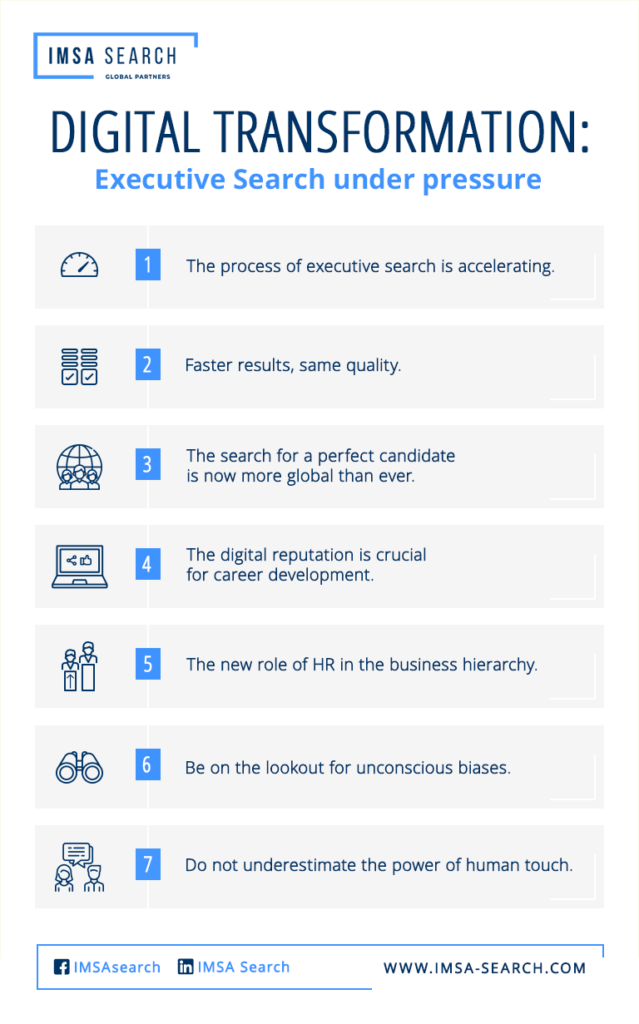Digital transformation: Executive Search under pressure
With IMSA Search Global Partners, we are taking a closer look at the changes, chances and challenges that digital transformation evokes in the lives of top management and their companies.
According to the OECD paper, “almost no business today is run without digital technologies.” The scope and speed of the process varies across countries, sectors and organizations, but there is a change-evoking ocean, and no safe harbor for a single company or a single market. There are many challenges posed by digital transformation – namely artificial intelligence, internet of things, massive communication and machine learning.
“The companies have to change existing business models, and their ways of managing people. Governments must consider new laws and regulations. But it all boils down to one fundamental question: do we have the right mindset?” asks Hard Olav Bastiansen, IMSA Search Norway.
“A service like ours – that searches for the top management positions – will play a vital role in this brave new world. Assessing whether a candidate has the right mindset or not will be essential for every business” says Hard Olav Bastiansen. What are the crucial traits, in this new, digital mindset? How the digital transformation will affect the way top managers get hired? And last but not least: how can you find the perfect balance between technologies and human touch in the recruitment of top executives? Let examine the survey below.
#1: The process of executive search is accelerating
The entire process of locating the right candidate to fill the open position is rapidly gaining momentum. “Digitalization makes the recruitment process faster and more efficient at some point. Employers are expecting recruitment results in 70% shorter time than a decade ago,” explains Monika Ciesielska, President of IMSA Search Global Partners and CEO of IMSA in Poland.

How can you identify the perfect candidate in such a short time? Supporting algorithms is becoming necessary. Tailor-made assessment tools already have some fans among recruiters, and there will be many more advancements in this kind of tech in HR. “If I have to tell you what happens in the nearest future, I would say that technology will change the headhunting tasks permanently. We see the first signs already. ATS (applicant tracking systems) and 100% accurate CV parsing is becoming more important, as they add value both for the researcher and the client. Initial interviews with candidates are going to become more important through the use of chatbots,” predicts Patrick Van Lijsebetten, IMSA Search Belgium

#2 Faster results, same quality
Nevertheless, shortening the time of headhunter work, without losing the quality, is the most critical challenge right now. “We have easier access to candidates, but it comes with a price. When we are operating in the middle – or C-level – we need to have the best outcome possible. Catching up with top-level management is not taking minutes, even though that would be ideal. If we decide to move too quickly in top-level recruitment processes we will start losing quality,” says Monika Ciesielska, IMSA Search Poland.
#3. The search for a perfect candidate is now more global than ever
Thanks to the internet, it’s much easier to access and contact candidates all over the world. It’s becoming more common to relocate to another country – even a continent – to seize a better career opportunity. Africa is a prime example: “Thanks to globalization, new technological hubs and new job opportunities are showing up not only in Europe or the US. For example, M-pesa, a mobile money transfer service launched by Safaricom, a network operator in Kenya, has taken the markets by storm. In some aspects of the Fintech world, Africa is way ahead of the West. It has greatly impacted business operations and has been viewed in awe by leaders on a global scale,” says Vanessa Strong, IMSA Search Kenya. As one of the Fintech promised lands, Kenya attracts more talented people from the Fintech industry. The headhunting process is running on a global scale, now more than ever.
#4 The digital reputation is crucial for career development.
To meet market requirements, recruiters must take a closer look at the candidates, especially at their “digital reputation”.
“We know more about the candidates by viewing their activities in social media and checking their branding activities. Higher management is usually most active on LinkedIn. It offers a deeper look at the candidates’ “digital outcome”. For example, it reveals how they react to criticism of others, how they comment on particular topics, which articles appeal to them and the depth of knowledge they share. This is a vast supply of information to add to a standard personal interview, when we have a limited time to check and evaluate competencies,” says Monika Ciesielska.

#5 The new role of HR in the business hierarchy
The fear of being replaced by robots is rising in the recruitment business, as well. But not everyone sees the future in such dark colors – where an algorithm substitutes a consultant.
“I believe that the digital transformation will increase the importance of the HR manager.” Until now, this has been a staff role that in most organizations has no real authority. In the future, with new sets of “soft” data being collected, HR will be able to much better predict the organizational outcomes. What will happen in the organization? Who will resign? What personal features or traits will be missing? This will give real power and new authority to the Chief HR Officers and bring them much closer to the CEOs. The HR officers will become real organizational designers and leaders of change,” says Stig-Rune Reese, IMSA Search Norway.

#6 Be on the lookout for unconscious biases
“In many countries, the recruitment process now primarily begins online. The headhunter can view a profile picture and other photos publicly posted on social media. This might speak about the race, gender, age, and other attributes of individuals that can potentially influence the sourcing process. Because of this – usually unconscious recruiter bias – some candidates might not ever proceed to the face-to-face interview phase,” warns Monika Ciesielska.
This sounds like the GDPR issue in Europe (General Data Protection Regulation introduced in European Union), but globally, the researchers need to think and introduce the strict set of rules and procedures, which protect the potential candidates from too much influence from the lives they live online.
#7 Do not underestimate the power of human touch
Is falling in love with hi-tech solutions the best way to survive the digital transformation process? “My concern is always a balance between the digital and human interface. It’s crucial to guard against becoming lazy and relying too much on digital transformation. The computer is as good, as the user,” says Vanessa Strong, IMSA Search Kenya.

“Rush is a bad adviser, especially when such a revolutionary change takes place. We are preparing ourselves to adapt to this digital future. But short term, we will not make significant changes to our recruitment process. For example, there are a lot of companies and projects, where an old-school, face-to-face interview and assessment review works best,” says Mirtjahjanto Adi Mitrono, IMSA Search Indonesia.
Digital Transformation – a chance, or a threat?
“According to McKinsey, the digitization of companies is still less than 40% of its potential. Companies think they are transforming, but most of them do not realize that digital transformation will be a permanent form of being,” explains Lizette Ibarra, IMSA Search board member from Mexico. “As an outcome, the gap between ‘old fashioned’ and ‘modern’ businesses will grow, and we as headhunters will have to be able to reach out to both groups,” adds Anna Valouchová, IMSA Search Czech Republic. The main goal is to find candidates with the special mindset: open-minded and ready for digital change.
“People who are not change-enthusiasts or technology-lovers will struggle. We are in a fight or flight situation. Managers and CEOs must be able to follow the trends, see the opportunities and adapt to ensure their team’s or their company’s future success, “explains Anna Valouchová.
Digitalization has given the executive search business new tools and methods for researching, locating and identifying top candidates. New assessment tools and techniques are also growing trends, but the consultant’s personal competence will remain a prerequisite for success.
